The global hotel industry is a dynamic and vital sector within the travel and tourism market, serving millions of travelers annually and generating trillions in revenue worldwide.

As travel preferences evolve, the industry has adapted, offering everything from lavish luxury resorts to budget-friendly accommodations, extended-stay options, and boutique experiences tailored to diverse guest needs. Behind this vast array of options lies a handful of dominant hotel groups, each with a portfolio of brands strategically designed to cater to different segments—luxury, premium, economy, and extended stays. These major hotel groups in 2024, leverage their size, resources, and reach to provide consistency and quality across their properties, ensuring that travelers experience their desired level of comfort and service, regardless of location.
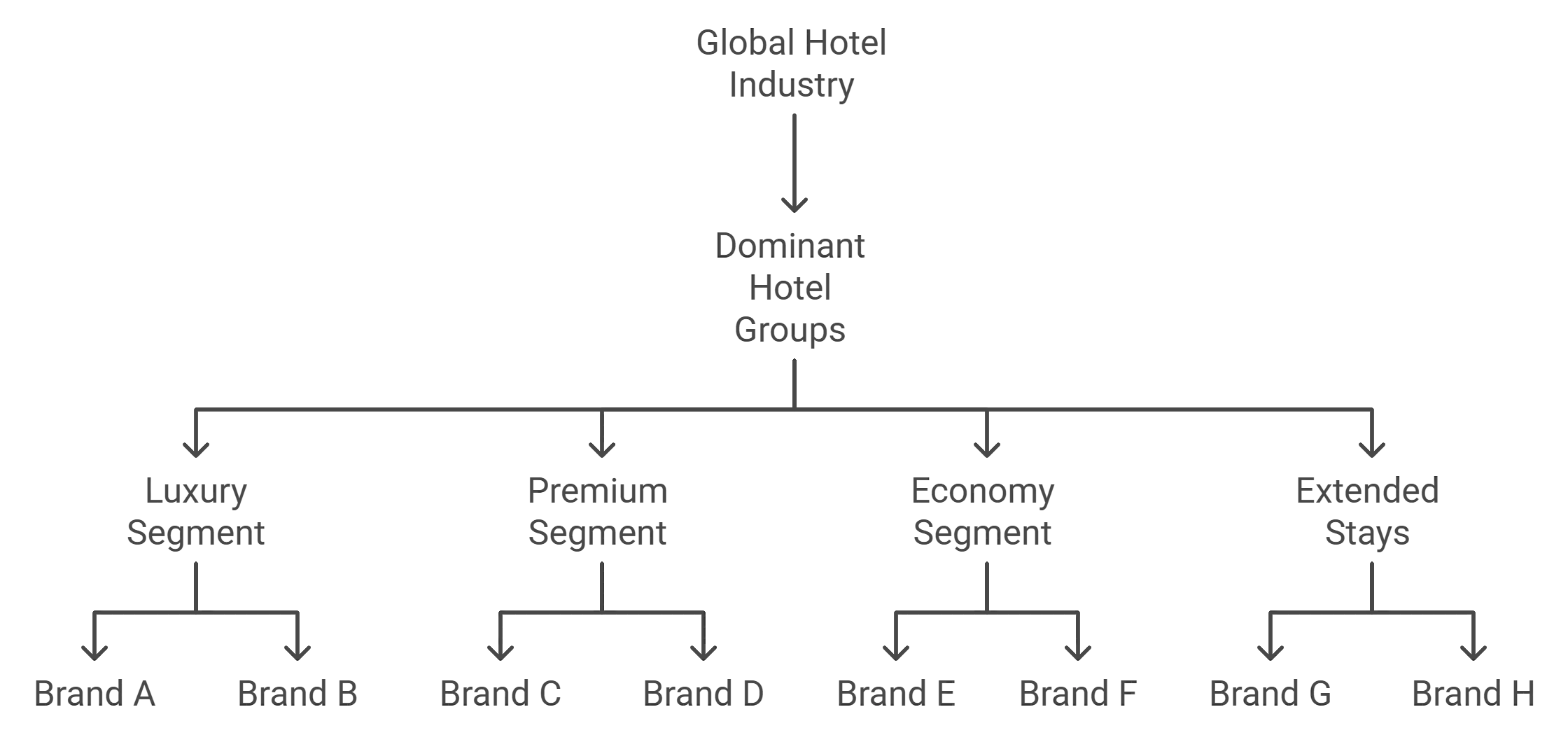
This blog will explore some of the largest hotel groups in the world, examining their diverse brand offerings, and delving into the unique strategies each group employs to maintain its foothold in the highly competitive hospitality market.
Overview of the Major Hotel Groups in 2024
The major hotel groups play a significant role in shaping global hospitality trends, influencing everything from the types of accommodations available to the standards of service that guests expect. By implementing strategies such as strategic acquisitions, market diversification, and brand expansion, these groups continue to broaden their appeal and presence across regions. Many have expanded through acquisitions of smaller hotel brands, enabling rapid growth while increasing brand diversity to cater to more market segments.

With their strong focus on innovation, these hotel groups are constantly evolving to meet the needs of modern travelers—whether by embracing sustainability, enhancing guest experiences through technology, or offering unique amenities. Their collective influence has redefined the industry, setting standards and trends that shape the way hotels operate and guests experience travel across the globe.
Detailed Breakdown of Major Hotel Groups in 2024
Marriott International
Marriott International stands as the world’s largest hotel group, boasting an extensive network of over 8,600 properties spread across 139 countries. This impressive reach has solidified Marriott’s presence in nearly every corner of the globe, making it a preferred choice for both leisure and business travelers. With more than 30 brands under its umbrella, Marriott caters to a wide range of preferences and budgets. Here’s a breakdown of its key brands by category:
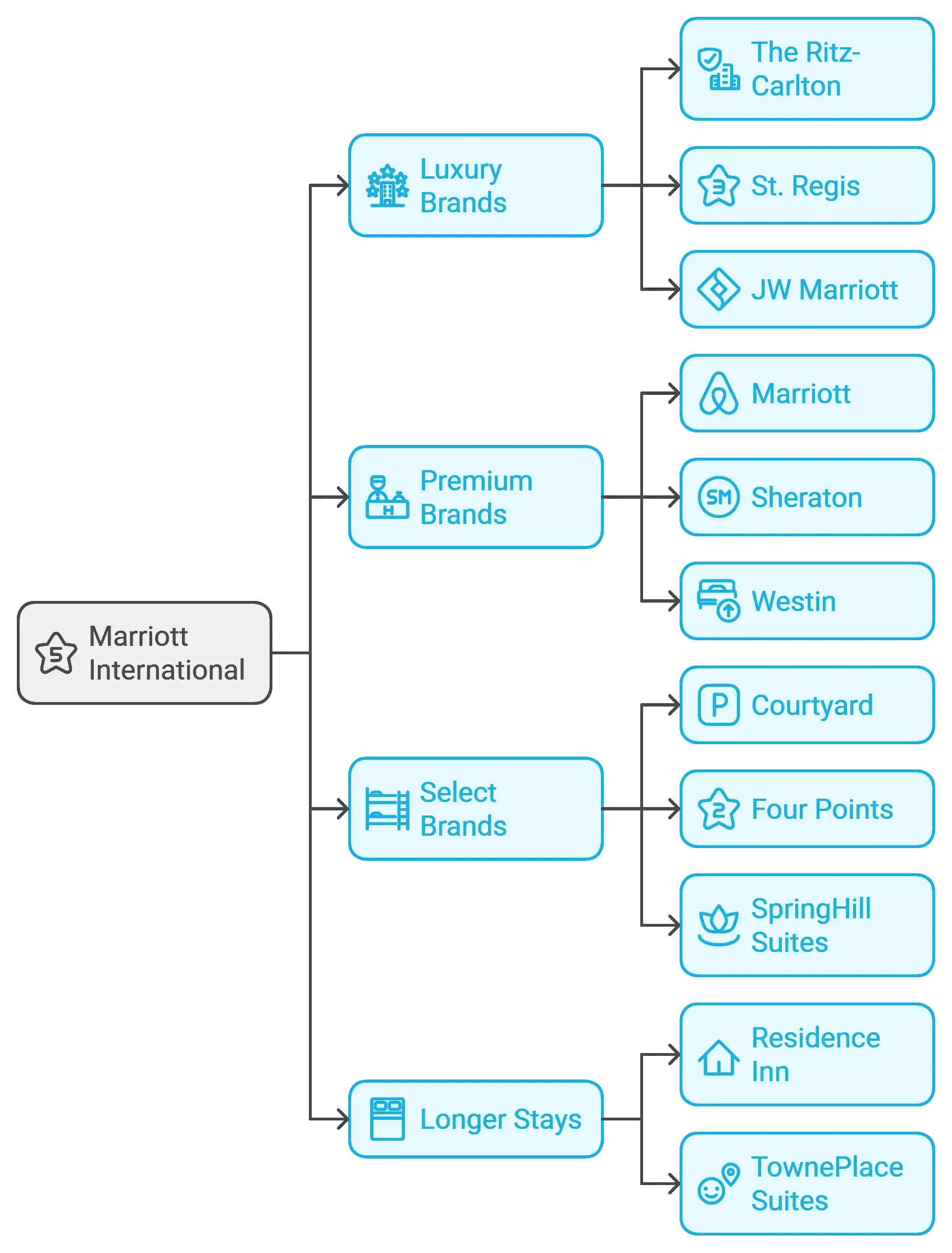
Luxury: For travelers seeking high-end experiences, Marriott offers brands such as The Ritz-Carlton, St. Regis, and JW Marriott. These luxury hotels are known for exceptional service, elegant design, and prime locations.
Premium: Marriott, Sheraton, and Westin fall into this category, offering upscale accommodations that balance comfort with a touch of luxury, appealing to business and leisure travelers alike.
Select: With brands like Courtyard, Four Points, and SpringHill Suites, Marriott targets budget-conscious travelers who seek a consistent, quality experience without luxury price tags.
Longer Stays: Residence Inn and TownePlace Suites are designed for guests who need accommodations for extended periods, offering the comforts of home with spacious rooms and amenities like kitchens.
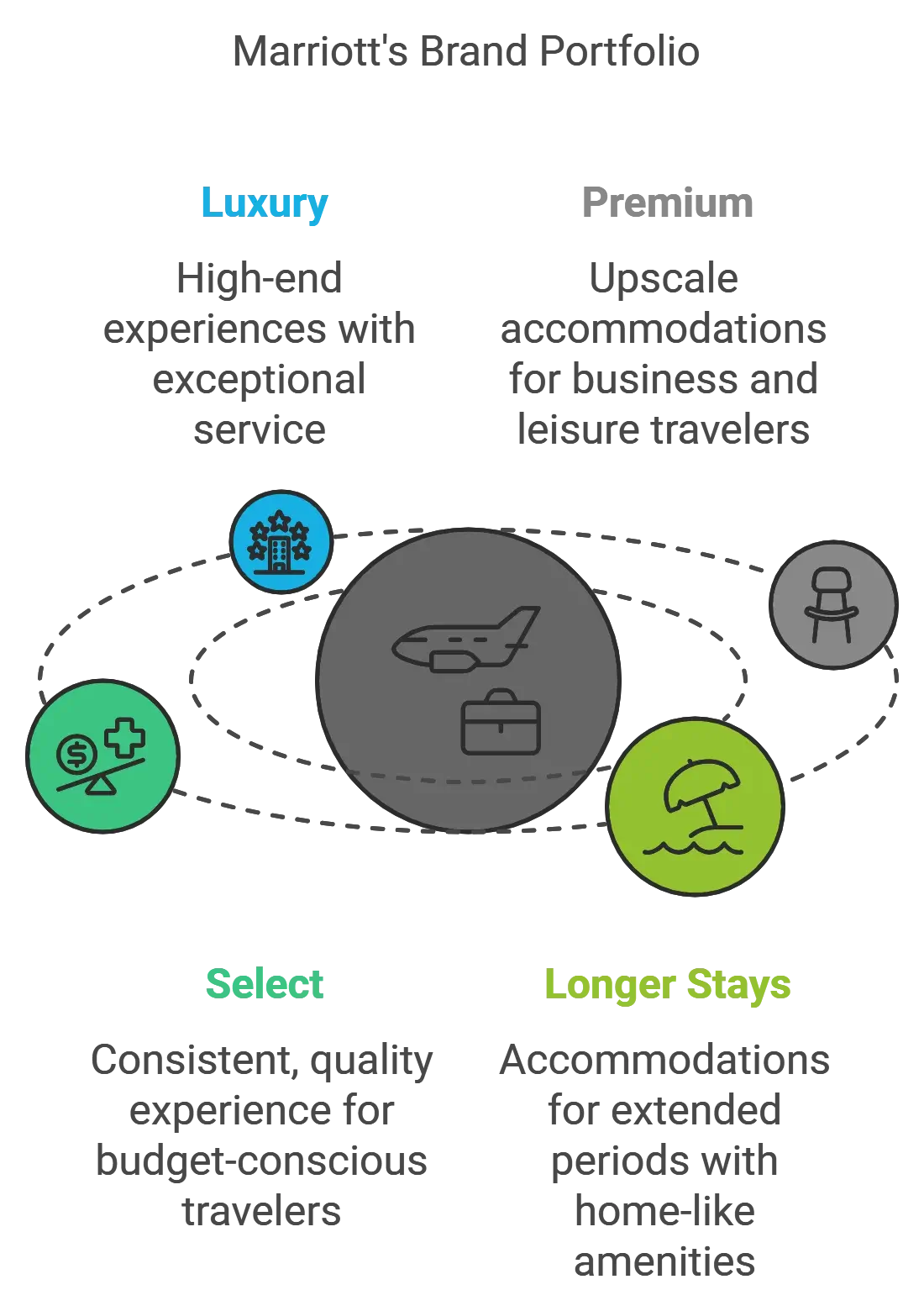
Marriott’s growth strategy continues to prioritize expansion in high-growth regions, particularly in the Asia-Pacific market, where rising travel demand presents vast opportunities. The company is also focusing on bolstering its luxury and lifestyle segments, positioning itself as a leader in these high-value markets.
Jin Jiang
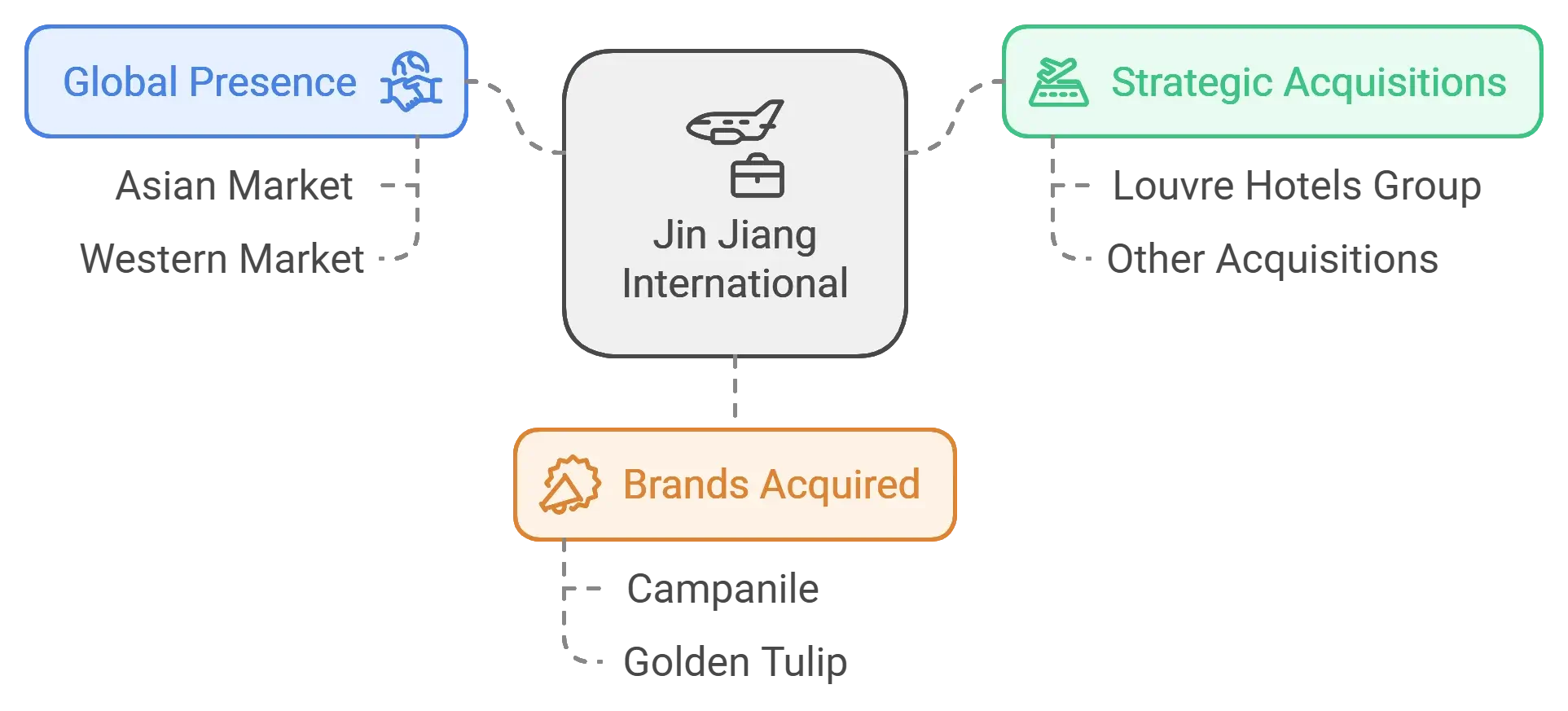
Jin Jiang is a formidable player in the global hotel industry, particularly in the Asian market, where it has built a solid reputation. Although it remains less familiar to Western travelers, Jin Jiang’s impressive scale and steady growth make it one of the world’s top hotel groups. The company’s global expansion has been largely fueled by strategic acquisitions, including its purchase of the Louvre Hotels Group, which brought brands like Campanile and Golden Tulip under Jin Jiang’s wing.
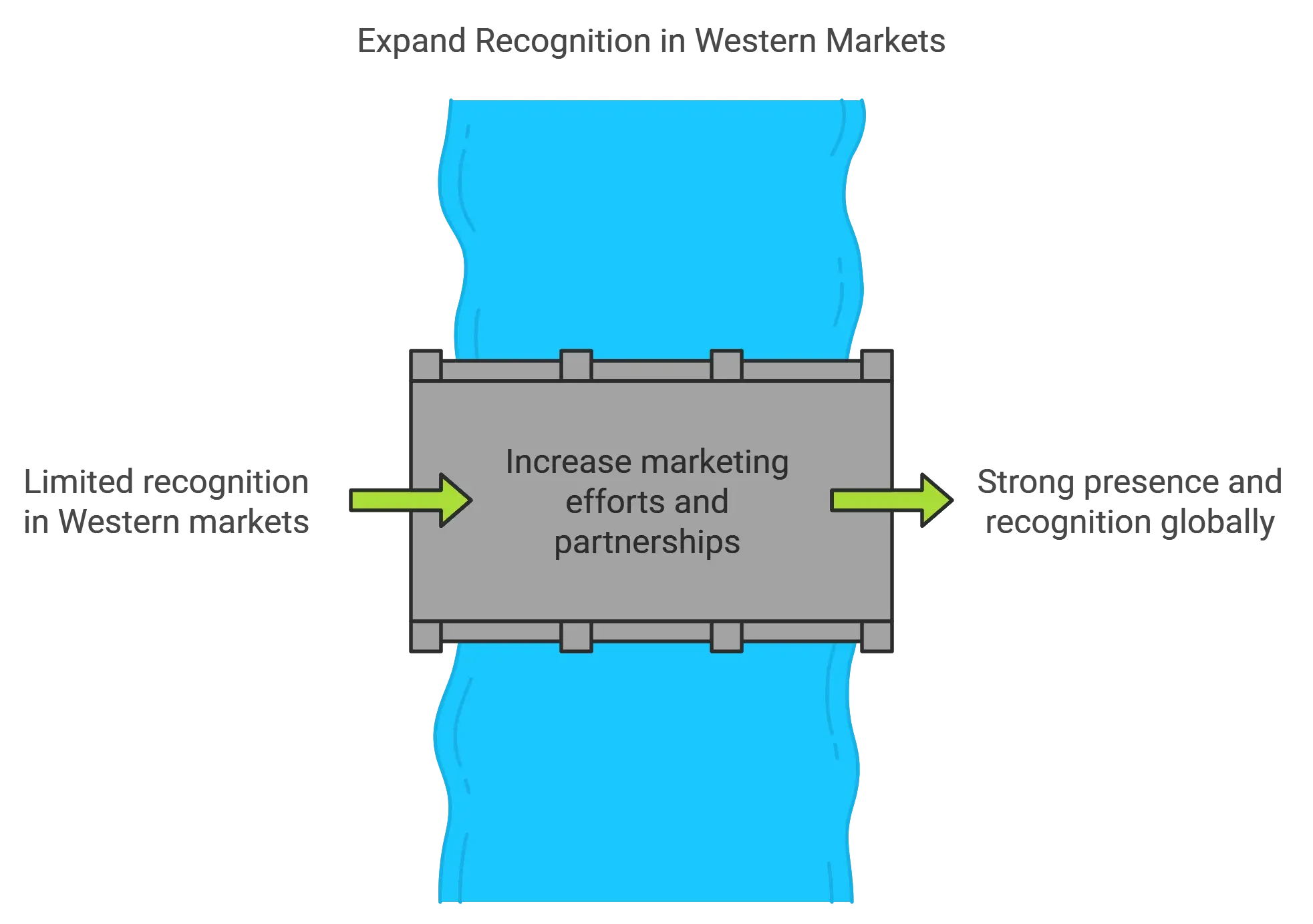
While it may not be as widely recognized in Western markets, Jin Jiang’s rapid growth and extensive portfolio position it as a key competitor. Its influence is growing as the group continues to build its presence internationally, particularly through its stronghold in Asia and increasing global footprint. This positioning reflects Jin Jiang’s dedication to expanding beyond its traditional markets, establishing itself as a powerhouse in the hotel industry worldwide.
Hilton Worldwide Holdings
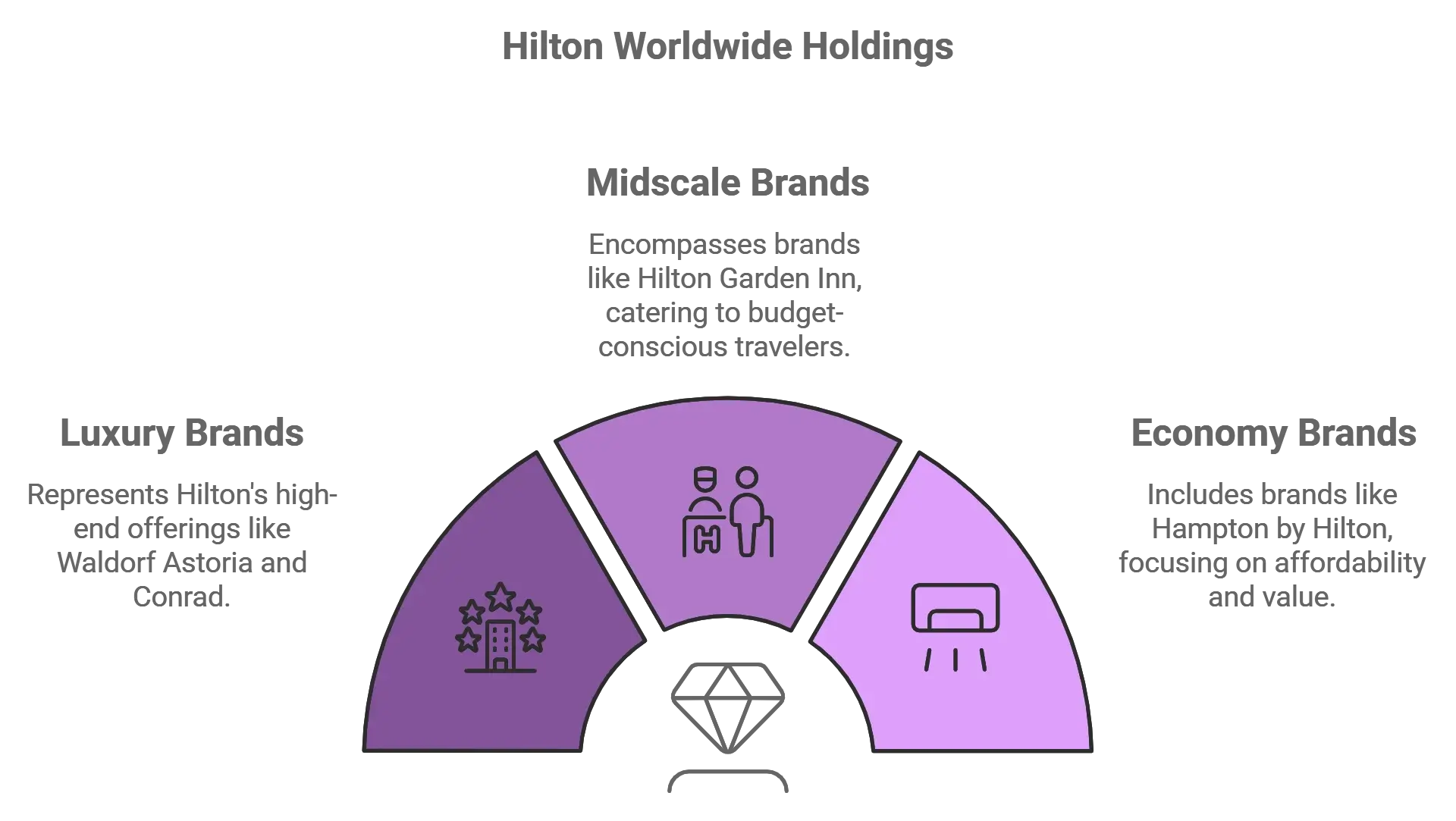
Hilton Worldwide Holdings is one of the most recognizable names in hospitality, with a global presence that spans over 7,000 properties in 123 countries. Known for its commitment to quality and service, Hilton offers a range of brands tailored to meet the diverse needs of travelers across various markets and segments. Here’s a breakdown of Hilton’s primary brands by category:

Luxury: Hilton’s luxury portfolio includes Waldorf Astoria and Conrad, which are known for their refined elegance, high-end amenities, and prime locations. These brands cater to affluent travelers seeking unique, upscale experiences.
Full Service: The flagship Hilton brand, along with DoubleTree and Curio Collection, comprises Hilton’s full-service offerings. These properties provide an elevated experience with ample amenities, catering to both leisure and business guests.
Focused Service : Hampton and Hilton Garden Inn are Hilton’s focused-service brands, offering essential amenities at accessible prices. Known for their consistency and comfort, these brands target budget-conscious travelers who don’t want to compromise on quality.
All Suites : Embassy Suites and Homewood Suites fall under Hilton’s all-suites category, designed for guests who need more space or are staying longer. These brands provide apartment-style accommodations with separate living areas and kitchenettes.
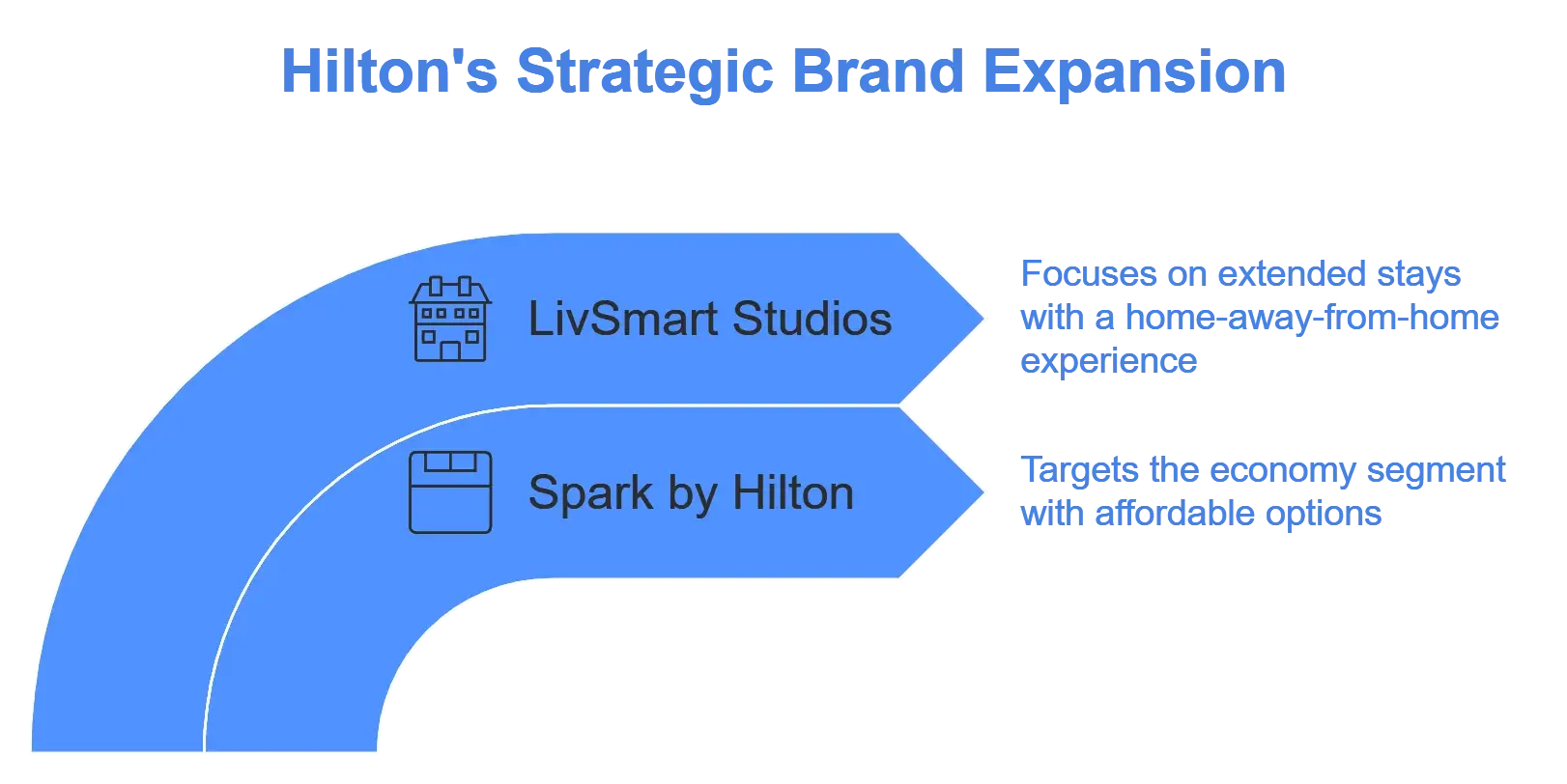
In recent years, Hilton has introduced new brands aimed at capturing niche markets and emerging travel trends. Notable additions include Spark by Hilton, which targets the economy segment, and LivSmart Studios, an extended-stay brand that focuses on providing a home-away-from-home experience for longer stays. These expansions reflect Hilton’s strategy to diversify its offerings and tap into growing demand for flexible and affordable accommodations across various segments.
InterContinental Hotels Group (IHG)
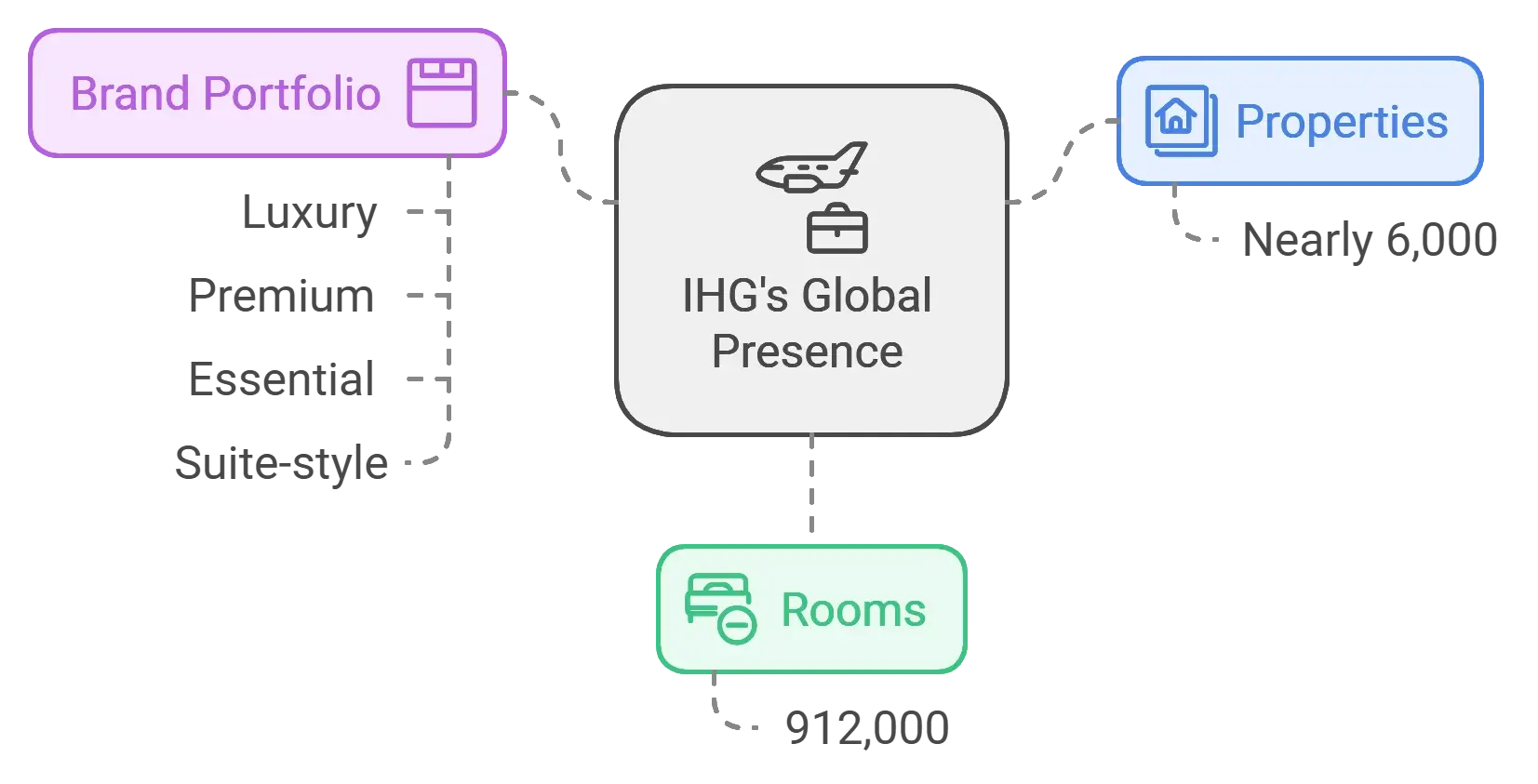
InterContinental Hotels Group (IHG) is a global leader in hospitality, boasting nearly 6,000 properties worldwide and a total of 912,000 rooms. Known for its strong brand portfolio, IHG offers options across luxury, premium, essential, and suite-style accommodations, appealing to a broad range of travelers.
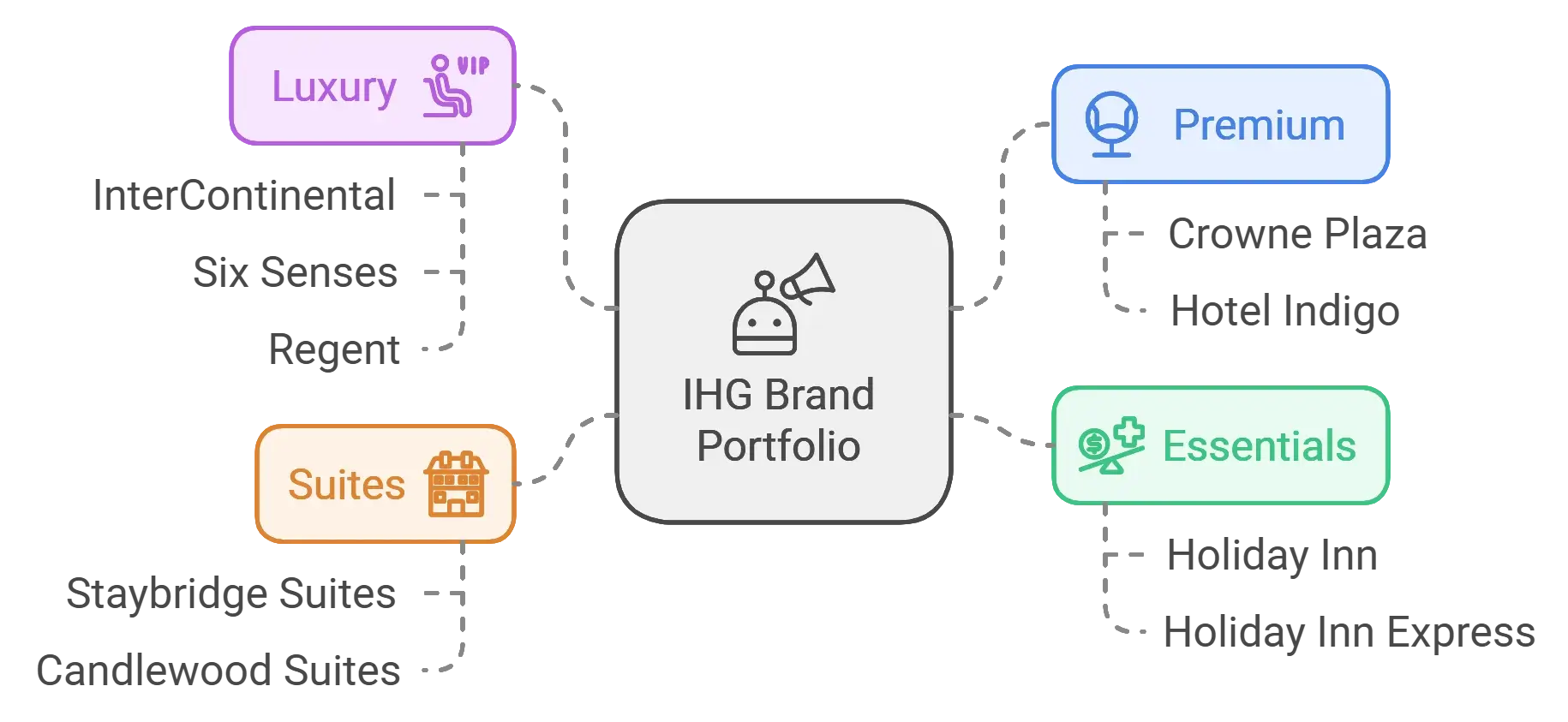
Luxury: IHG’s luxury category includes iconic names such as InterContinental, Six Senses, and Regent. These brands are synonymous with upscale experiences, offering exceptional service and locations, particularly appealing to affluent, experience-driven travelers.
Premium: IHG’s premium brands, Crowne Plaza and Hotel Indigo, provide an elevated, design-forward experience that caters to both business and leisure guests. Hotel Indigo, in particular, emphasizes boutique-style stays, often reflecting the local culture and design of each property’s surroundings.
Essentials: With brands like Holiday Inn and Holiday Inn Express, IHG serves the essential travel market. Holiday Inn is one of the most recognized names in hospitality, known for its family-friendly appeal and consistent amenities, while Holiday Inn Express caters to budget-conscious travelers looking for a streamlined, comfortable experience.
Suites: IHG’s Staybridge Suites and Candlewood Suites brands are designed for extended stays, providing guests with the convenience of fully equipped kitchens and ample living space. These properties attract travelers who seek more home-like accommodations, especially for longer visits.
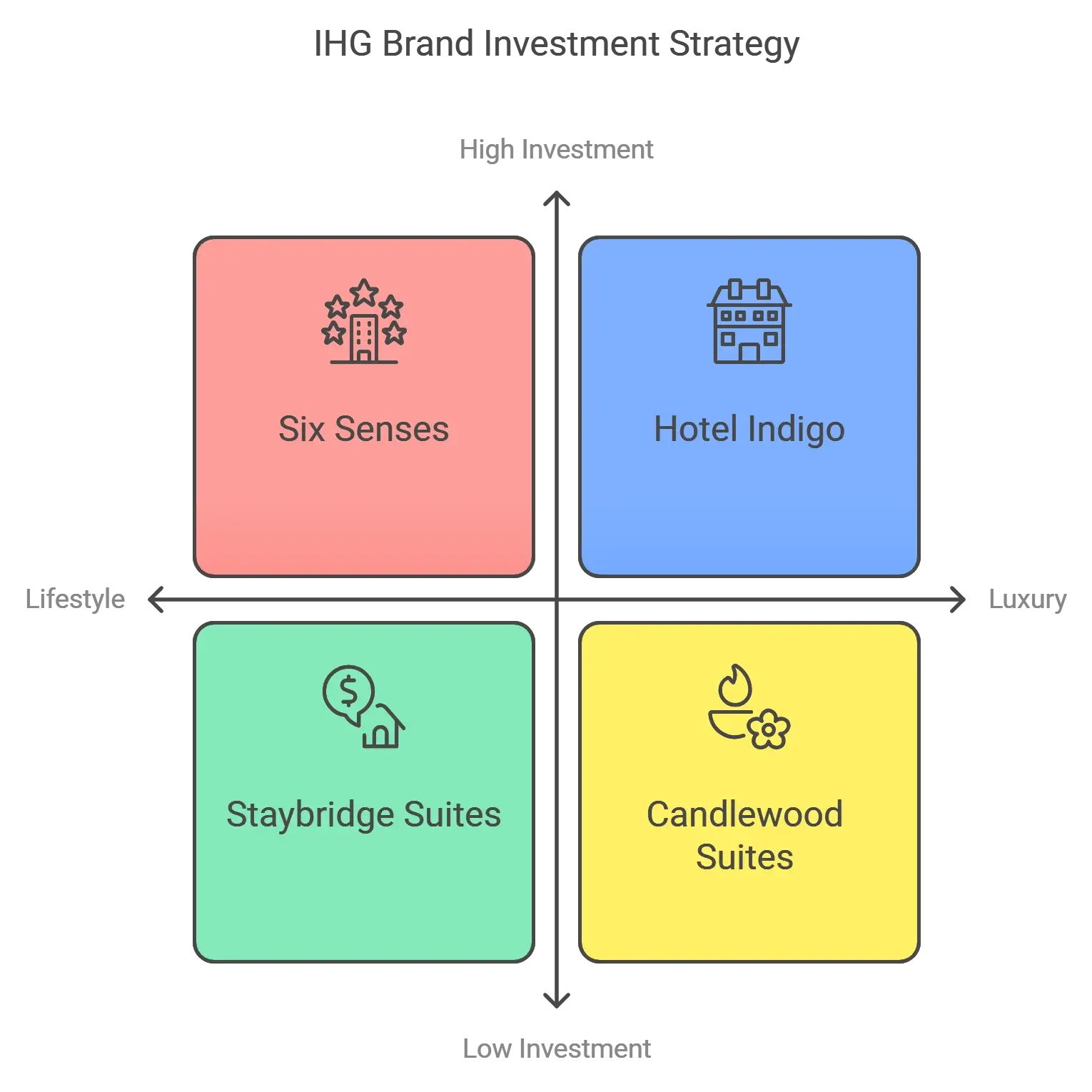
IHG has been focused on growing its luxury and lifestyle offerings, which now make up a significant part of its development pipeline. The group’s investments in brands like Six Senses and the continued expansion of Hotel Indigo illustrate IHG’s commitment to capturing a greater share of the high-end and lifestyle-oriented market segments.
Wyndham Hotels & Resorts

Wyndham Hotels & Resorts has the distinction of operating one of the largest networks of hotels globally, with more than 9,000 properties across 95 countries. While the group’s focus leans toward economy and midscale accommodations, Wyndham’s extensive reach makes it a significant player in the global hospitality market.
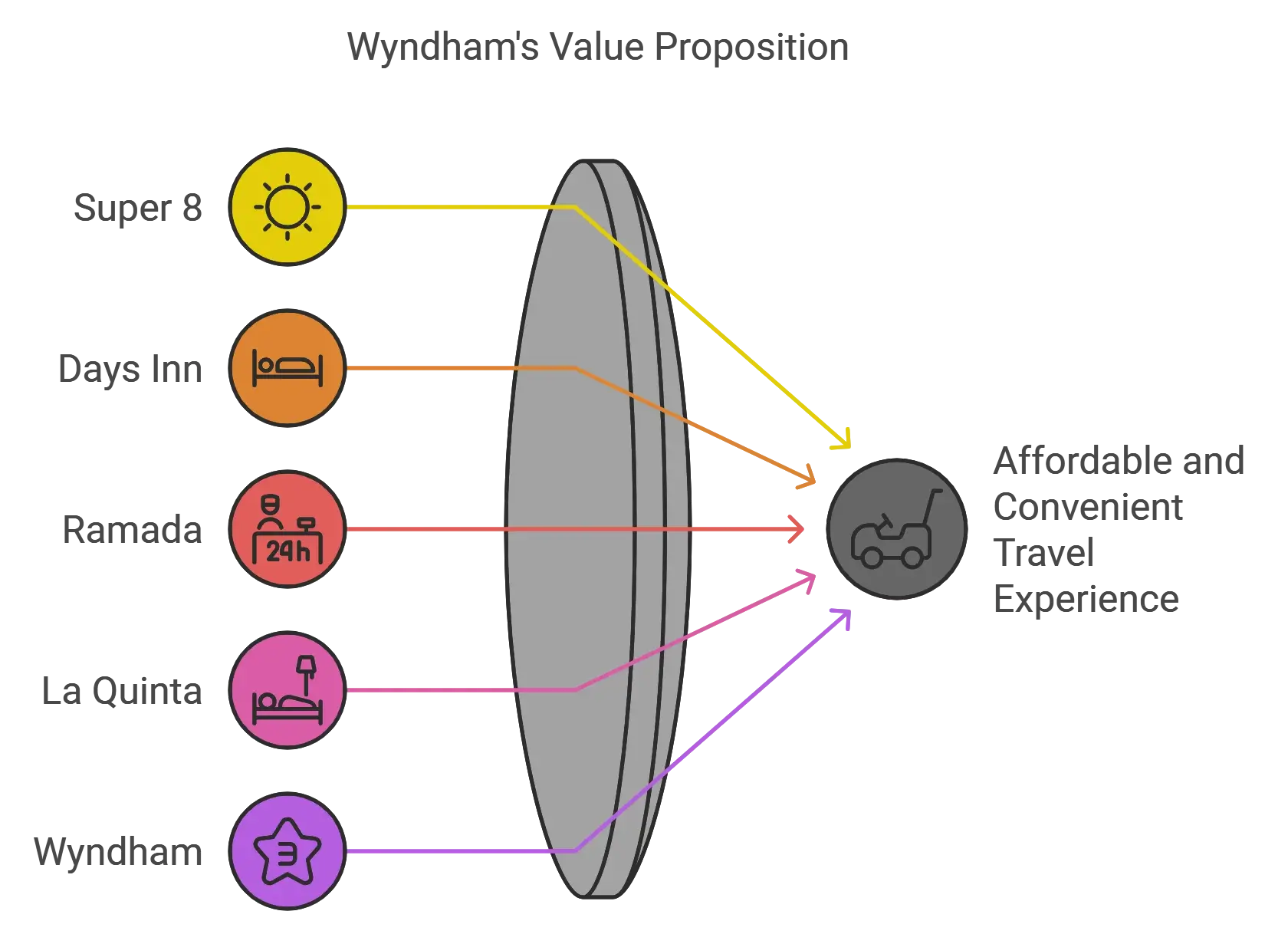
Economy and Midscale Brands: Wyndham’s portfolio primarily caters to travelers seeking affordable and convenient accommodations. Key brands include Super 8, Days Inn, Ramada, La Quinta, and Wyndham. These brands offer budget-friendly options that emphasize comfort and accessibility, with locations frequently positioned along highways and in key travel hubs.

Wyndham’s strategy centers on making quality accommodations accessible to a wide range of travelers, with an emphasis on affordability and convenience. Its economy and midscale brands are particularly well-suited for budget-conscious travelers and families, making Wyndham a go-to choice for those seeking value in their travel accommodations.
Accor

Accor stands as a leading French hospitality group with a global presence that includes over 5,400 properties across a wide range of segments. Known for its European heritage, Accor has solidified its position as one of the major hotel players worldwide, catering to a variety of travelers with brands that span from luxury to economy.
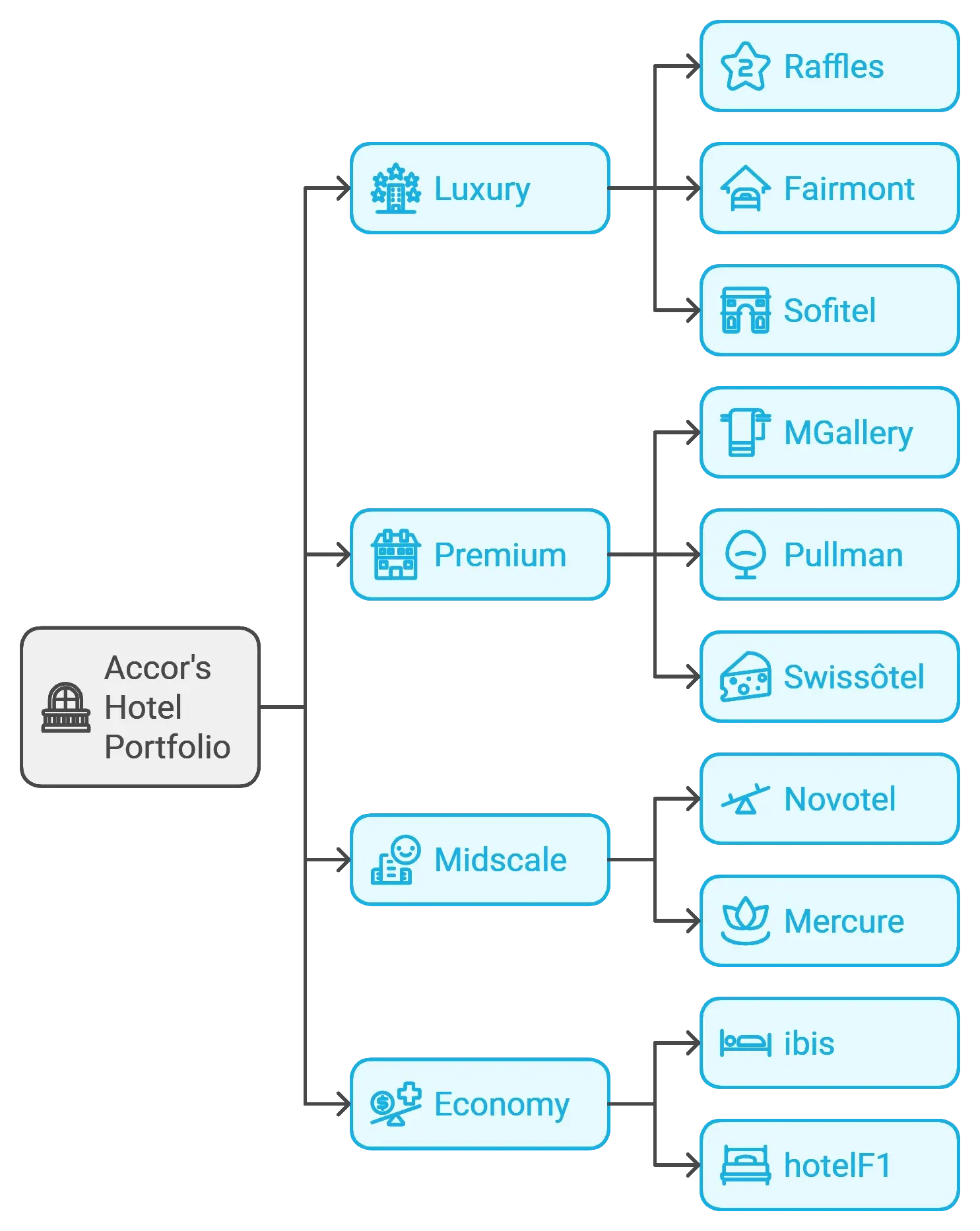
Luxury: Accor’s luxury portfolio boasts iconic names like Raffles, Fairmont, and Sofitel. These brands are renowned for their elegance, top-tier service, and prestigious locations, appealing to discerning travelers seeking premium experiences. Raffles, for instance, is celebrated for its heritage properties, while Sofitel combines French art de vivre with local influence.
Premium: The group’s premium brands include MGallery, Pullman, and Swissôtel. MGallery offers boutique-style stays with a focus on unique storytelling and design, while Pullman targets business travelers with modern amenities. Swissôtel combines Swiss hospitality with contemporary accommodations, known for its health and wellness offerings.
Midscale: Accor’s midscale options, Novotel and Mercure, are widely popular among business and leisure travelers alike. Novotel provides family-friendly amenities and a comfortable atmosphere, while Mercure offers a unique local touch in each location, making it ideal for travelers seeking an authentic, mid-tier experience.
Economy: In the economy segment, Accor’s ibis brand is one of the most recognized names globally, known for delivering consistent, affordable stays with a focus on comfort and quality. Additionally, hotelF1 offers budget accommodations primarily in Europe, catering to ultra-economy travelers with its no-frills, minimalist approach.
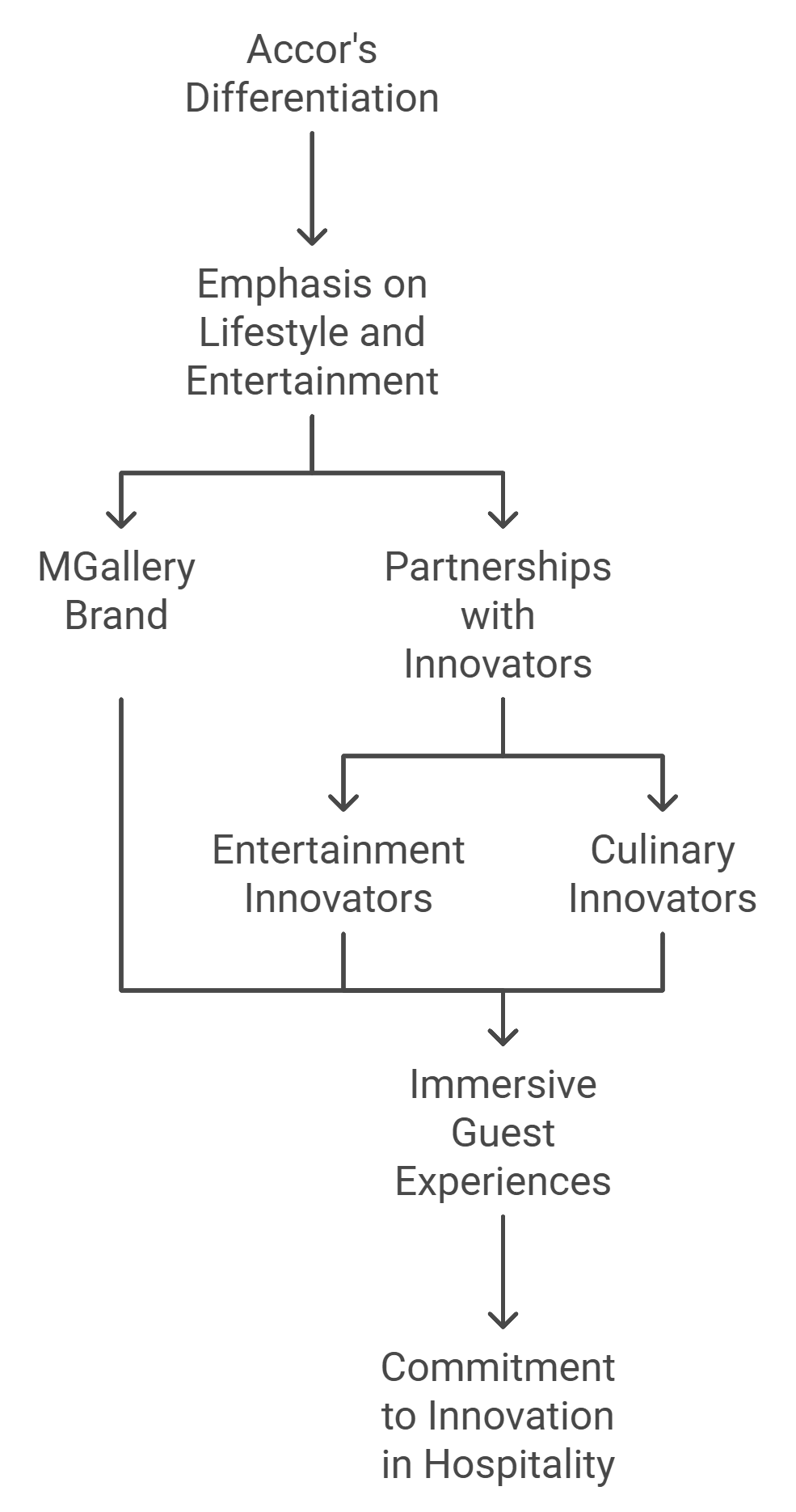
Accor has strategically positioned itself to stand out by emphasizing lifestyle and entertainment in its offerings. Through brands like MGallery and partnerships with entertainment and culinary innovators, Accor differentiates itself in the hospitality market by creating immersive experiences for its guests. This focus on lifestyle-oriented amenities and unique brand identities reflects Accor’s commitment to innovation in hospitality.
H World Group (Formerly Huazhu Hotels Group)

H World Group, previously known as Huazhu Hotels Group, has emerged as one of the fastest-growing hotel groups globally. Known for its impressive expansion, H World has significantly increased its presence, particularly through acquisitions within Europe, most notably Deutsche Hospitality. This strategic move not only bolstered its international portfolio but also positioned H World as a key player beyond its native Chinese market.
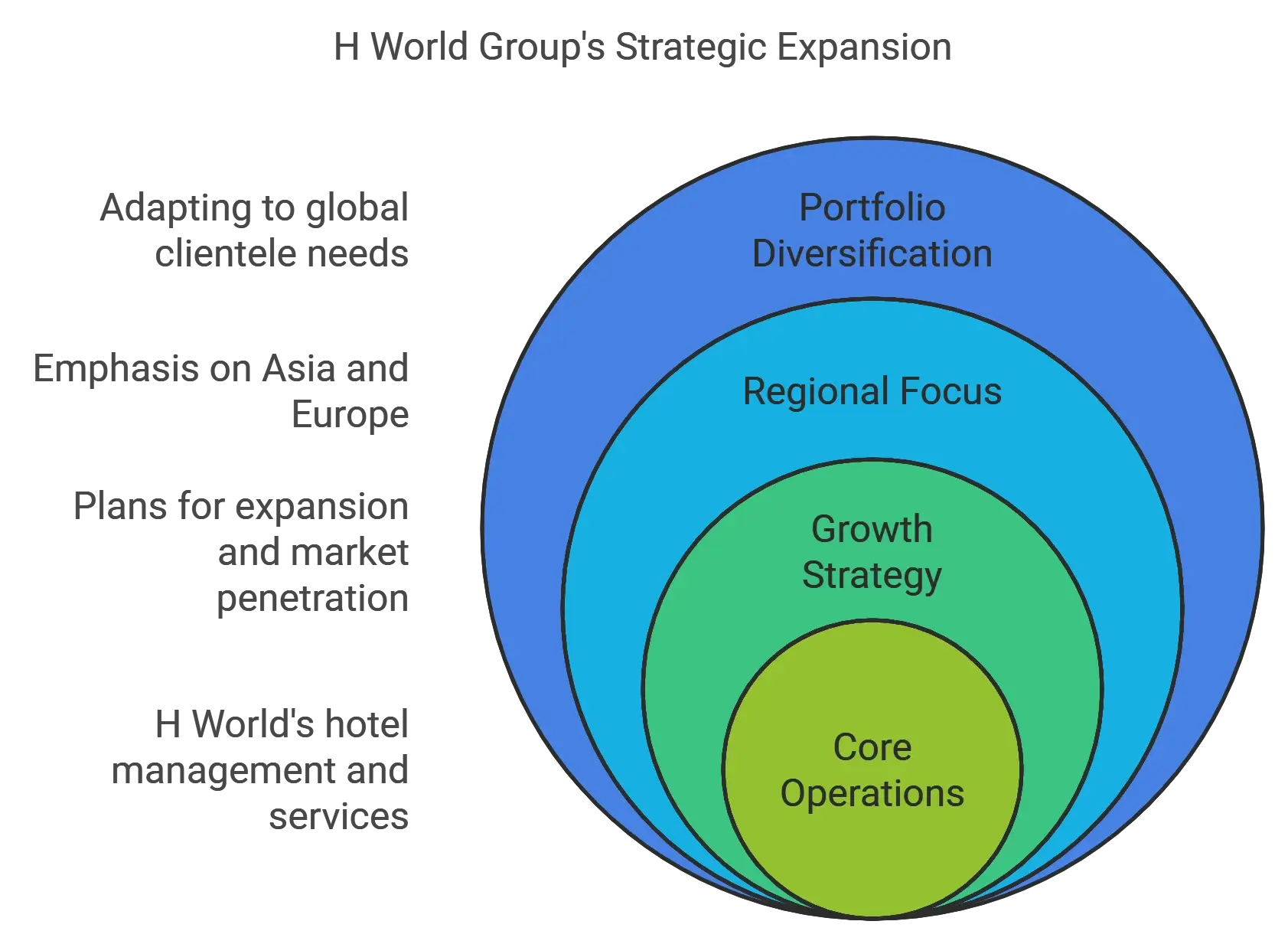
Today, H World operates approximately 8,800 hotels with around 845,000 rooms, placing it among the largest hotel groups in terms of room count. The company’s growth strategy centers on establishing a strong presence both in Asia and Europe, while diversifying its portfolio to meet the needs of an increasingly global clientele.
Conclusion
The major hotel groups—Marriott, Hilton, Jin Jiang, IHG, Wyndham, Accor, and H World—are shaping the global hospitality industry through innovation, adaptability, and a keen focus on evolving traveler preferences. These groups leverage strategies such as brand diversification, acquisitions, and lifestyle-focused offerings to meet the diverse demands of travelers worldwide. From luxury to economy options, these groups offer a wide range of experiences, ensuring that guests can find accommodations that suit their needs and budgets.
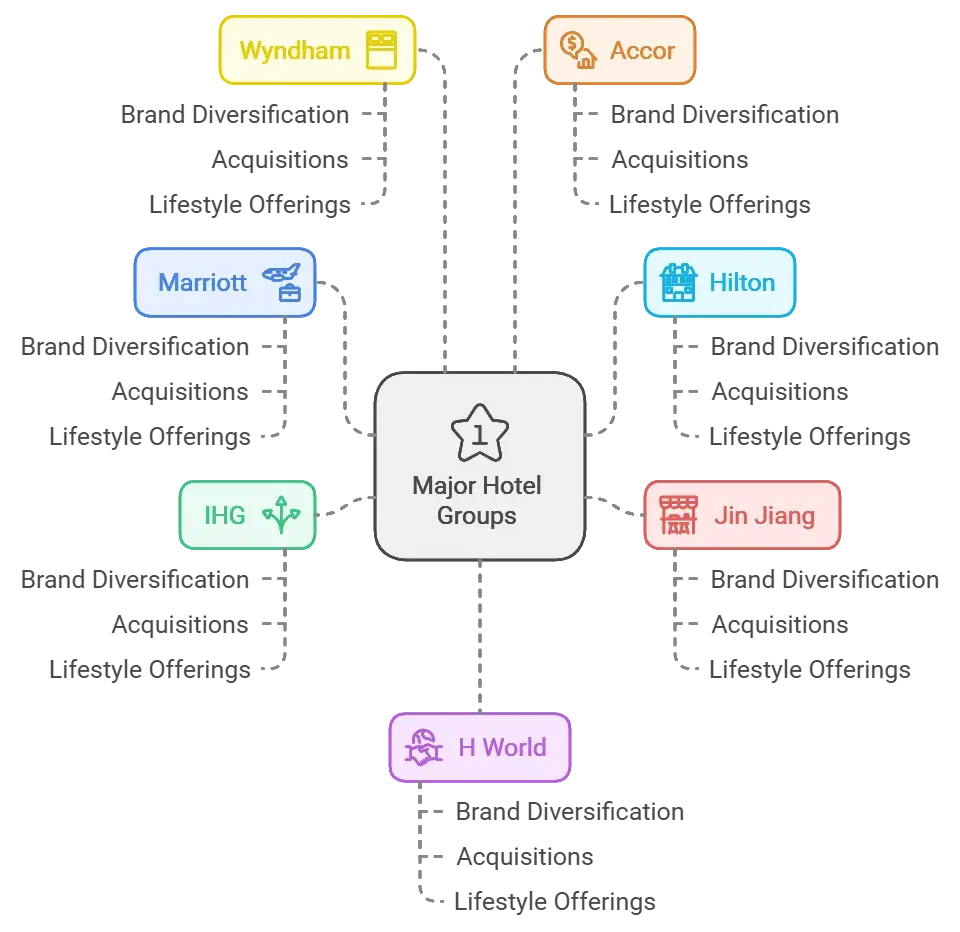
As these hotel giants continue to expand and diversify, they also prepare to meet the future by adopting emerging technologies and enhancing the guest experience with sustainable practices and lifestyle amenities. In the coming years, we can expect these hotel groups to further evolve, adapting to new consumer trends and market dynamics, thereby continuing to influence the hospitality landscape on a global scale.

FAQ´s
- What are the largest hotel groups in the world?
The largest hotel groups in the world include Marriott International, Hilton Worldwide, InterContinental Hotels Group (IHG), Wyndham Hotels & Resorts, Jin Jiang, Accor, and H World Group. These companies operate numerous brands that cater to various market segments, from luxury to budget accommodations. - How do major hotel groups ensure quality across their properties?
Major hotel groups maintain quality by implementing standardized service protocols, investing in staff training, and utilizing brand guidelines that ensure consistency in guest experience. They also leverage technology and guest feedback to continuously improve their services. - What types of accommodations do these hotel groups offer?
Hotel groups typically offer a range of accommodations, including luxury resorts, premium hotels, economy stays, extended-stay options, and boutique experiences. Each group has various brands tailored to different traveler needs and budgets. - How do hotel loyalty programs work?
Hotel loyalty programs reward frequent guests with points for stays, which can be redeemed for free nights, room upgrades, and exclusive perks. Each hotel group has its own loyalty program that offers unique benefits, encouraging customer retention and loyalty. - What trends are shaping the hotel industry today?
Current trends in the hotel industry include a focus on sustainability, the integration of technology for enhanced guest experiences, and a growing demand for lifestyle-oriented accommodations. Major hotel groups are adapting their strategies to meet these evolving traveler preferences.


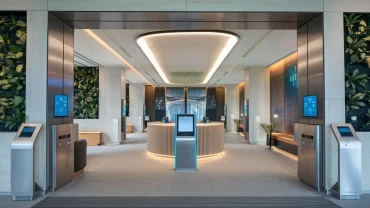

Comment (1)